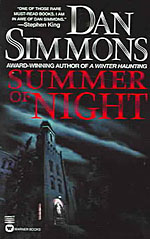
![]() verkisto
verkisto
7/26/2016
![]()
After finishing It, I thought I'd go back and re-read some other "idyllic yet horrific" reflections on childhood, and of course I dug up Dan Simmons' Summer of Night, the book I read when I was in college thinking it would be the next-best thing to It. At the time, it didn't have the same effect on me as It did, but then again, I was looking for the book to be another It instead of looking at it on its own terms. But it's pretty hard to separate them when even the blurbs in the book compare it to King's opus, and King himself has a big blurb right on the front cover of the book. It's clear the publishers thought to cash in on that association, and while the similarities are there, the comparison seems a little unjust.
There are a lot of ways that the books are similar -- they both have a cast of about seven main characters, all of which are pre-teen kids in the 1950s or '60s, and they're fighting against an ancient evil that the adults either can't or don't see -- but they also differ in major ways. For one thing, King's novel is very firmly set in its times -- the '50s and the '80s -- but Simmons' novel has a more timeless feel to it. Sure, there are some anachronisms that set the book in its time, but just by changing the details, the book could easily be set in modern times. That makes the book less immersive than King's, but only in the details; story-wise, the book blows King's out of the water.
The book feels more significant, more resonant than King's, possibly because of that timelessness. The friendship is the central part of the story, and everything relating to the plot flows from the characters and the friendship they have. The same is true of It, but somehow this friendship seemed more relevant, and more real, which seems really weird to me, seeing as how well I used to identify with the characters from It up until this last re-read. Maybe my idea and understanding of friendship has changed; maybe Simmons just manages to create deeper, more realistic characters than King does. Again, that sounds weird for me to say, since I've said for years (and still believe) that King's strongest talent is his effortlessness in creating sympathetic characters. But maybe sympathetic and realistic are two sides of the same coin. It's interesting to contemplate, at least.
I've read some complaints about how the book takes a while to get going, and regarding the plot, I'd have to agree. Simmons takes the time to create his characters first, and set up a string of atmospheric scenes to set the roots of the plot. It's hard to look back at the book and see how it could have improved -- as I mentioned, the characters and their friendship are the real story, so that sort of build up is pretty necessary -- but, yes, it does take a little while for the real plot to get going. Once it does, though, things move quickly, though not too quickly. In fact, I hadn't realized just how short a span of time those events took. In my memory, those events took a couple of weeks, but the real conflict and resolution takes just a matter of days. The final showdown in It was like that, too (what I had through spanned a few days actually took just a few hours), and maybe it's just that it had been so long since I had read both of the books.
So, the two books are begging comparison by their setting, characters, and plot, but the books couldn't be more different. It's just very interesting to me how my appreciation for the two books has flip-flopped over the years.